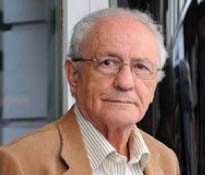Zeev Sternhell left us last Sunday.
Tireless peace activist, Archi-Zionist, as he liked to qualify himself, Zeev Sternhell was one of our godfathers. Historian of the French fascism, Professor at the Hebrew University of Jerusalem, he won the Israel Prize in 2008 for his work on political science.
Born in 1935 in Przemysl, Poland, in a Jewish Galician family, Zeev Sternhell was a Shoah survivor. Orphaned, he had been sent in 1946 to an uncle living in Avignon, where he resumed his studies and learned French. In 1951, he emigrated to Israel, where he went to farm school and lived on a kibbutz before studying at the University of Jerusalem.
Armor Officer, Veteran of Israel wars, he got out of the army with the rank of Reserve Lieutenant-Colonel.
Founder of Peace Now (Shalom Akhshav) he never stopped fighting occupation and warning his fellow citizens of its consequences on the Israeli society. Slightly wounded by a bomb planted outside his door by a Jewish extremist, he said afterwards that “This very act teaches us about the fragility of Israeli democracy.”
Here is an excerpt of one of his last interviews given in 2019 to
Haaretz where he was one of the official chroniclers. “I did not come to Israel to live in a binational state,” he said. “If I had wanted to live as a minority, I could have chosen places in which it is both more pleasant and safer to live as a minority. But neither did I come to Israel to be a colonial ruler. In my eyes, nationalism that is not universalist, nationalism that does not respect the national rights of others, is a dangerous nationalism. That is why I think the time is pressing. We have no time. And what worries me is that the good life here and the money and the stock market and the homes at Manhattan prices are producing a terrible delusion.
“My generation, which is the generation of the first decade of the state’s existence and for which the state’s very existence is a miracle, is slowly
leaving the stage,” he added. “And for us, it is a tragedy to see what is happening. For me, it is truly the end of the world. Because a person wants to ensure the future of his children and his grandchildren. As a citizen, I want to ensure the future of the society in which I live. And as a person I aspire to leave something, to leave fingerprints. I want to know that when I check out, my daughters and my granddaughters will continue to live a normal life here. That is all we wanted. But today I do not see that normal life as assured. I do not see the future of my daughters and granddaughters as assured. And that truly haunts me. What haunts me is knowing that what exists today is liable to fall apart tomorrow.”






